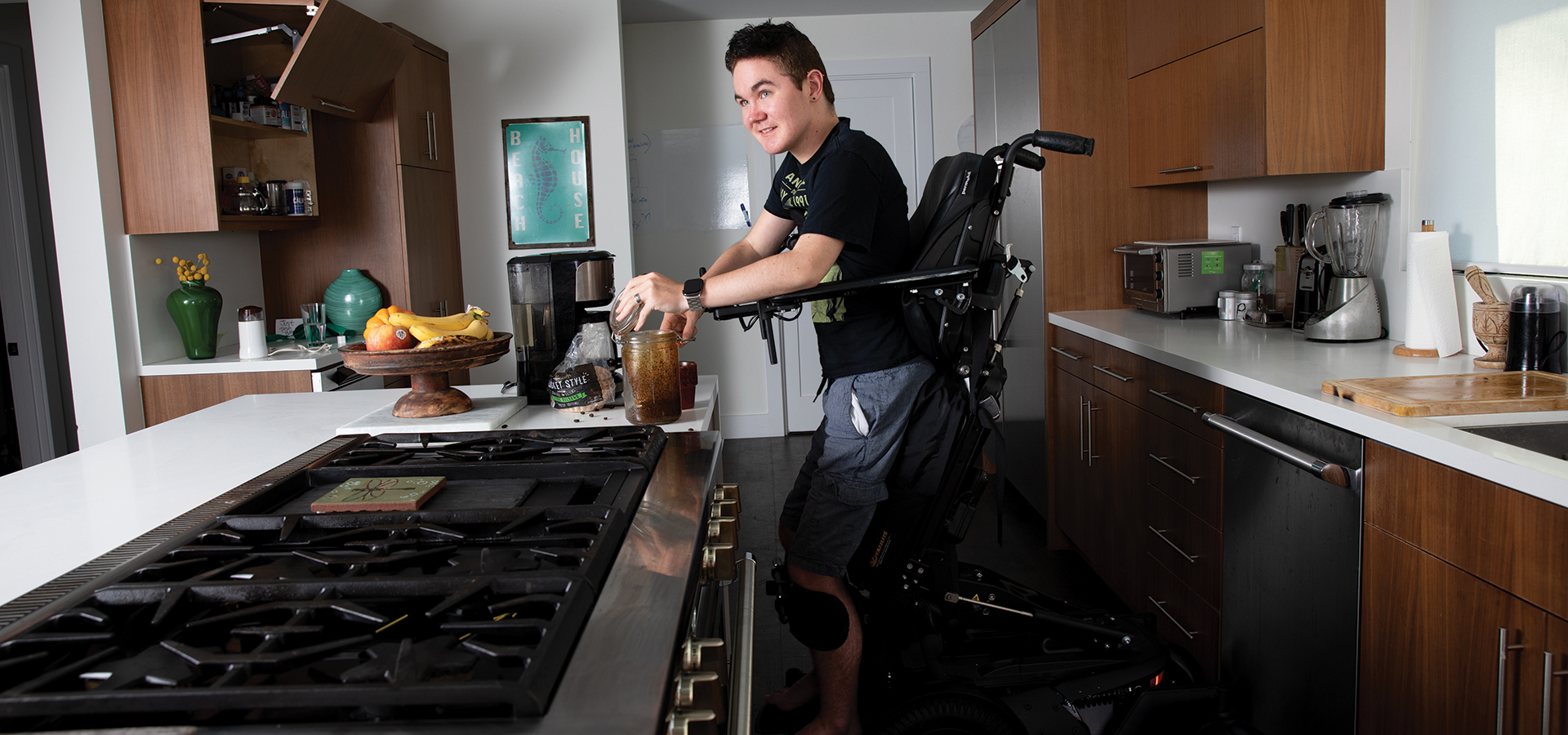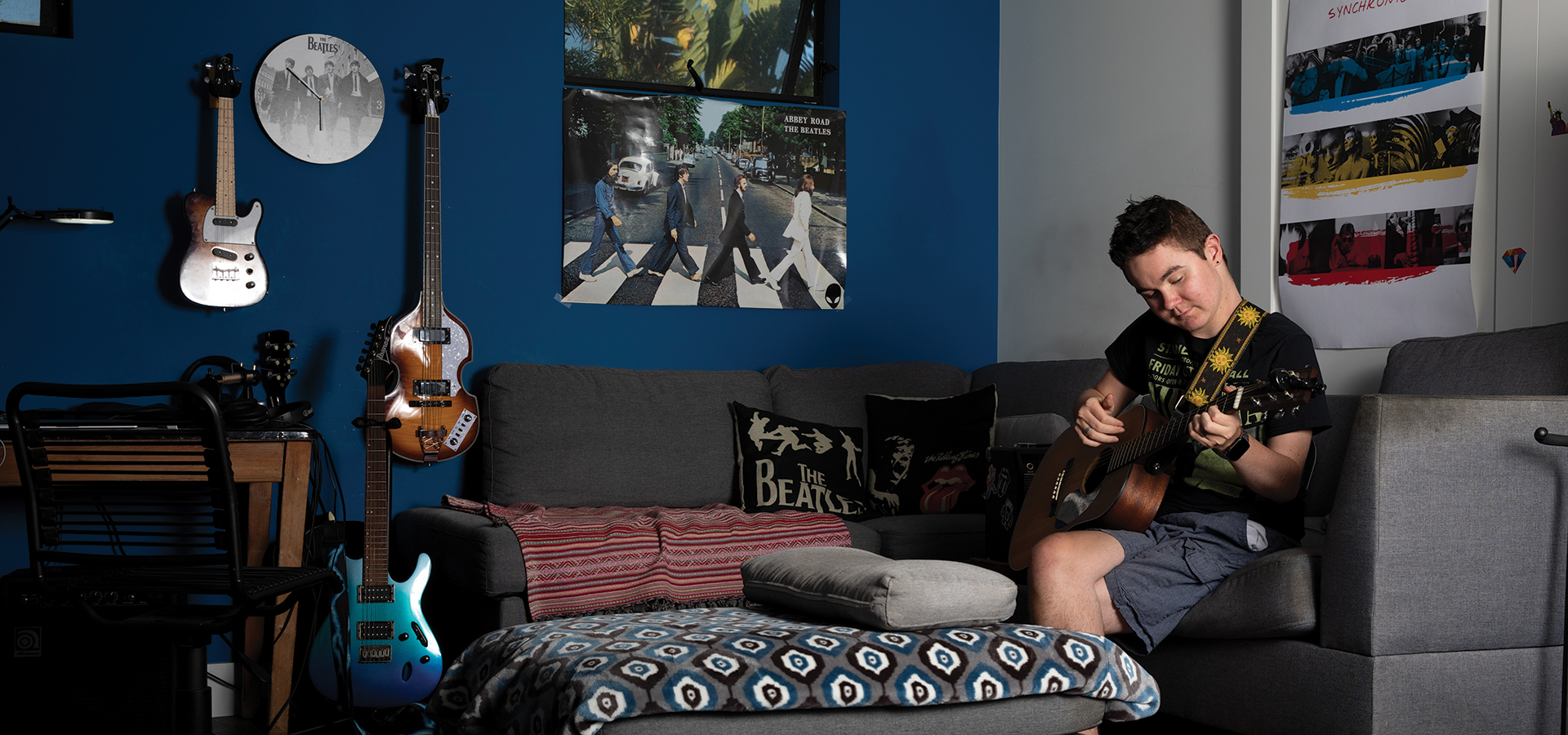After having extremely successful careers as international models, Cathy and Scott Jones settled down to have their family in the South Bay. Cathy gave birth to a healthy baby boy, Cooper, in October 2001. Life changed drastically, but they couldn’t have been happier to slow their jet-setting lifestyles and embark upon this new phase of family life.

By the time Cooper was 5, he wasn’t managing stairs well within their home—but it wasn’t too concerning. As first-time parents, it is hard to know what is normal and what is not, so they took him in for few tests.
Several months later, the phone rang at the Jones’ house. Cathy was home alone when the doctor delivered a nightmare diagnosis. Their seemingly healthy, 5-year-old son had just been diagnosed with an incurable disease: Duchenne Muscular Dystrophy (DMD). The doctor explained that Cooper would be in a wheelchair by the age of 12, with a life expectancy into his mid-20s.
Cathy, barely able to breathe, called Scott immediately and asked him to come home. She wanted to have this conversation in person. Emotionally, it was one of the hardest days of their lives.

DMD is a fatal disease that causes muscle degeneration due to a lack of a protein called dystrophin. In layman’s terms, people with DMD have weak muscles that break down if they are not careful with their movements. Tiny tears don’t rebuild themselves without dystrophin. The more they use their muscles, the weaker their muscles become.
It is the second most common genetically inherited disease. It is an X-linked condition, and after testing it was determined that Cathy was indeed the carrier. If Cathy had been born a boy, she would have had Duchenne. She is a first-time carrier; her mom had a spontaneous mutation when her eggs were created.
Boys with DMD have very thick calves—almost athletic-looking. In reality, they lose function of their legs. In elementary school, Cooper started using a mobility scooter just to protect his muscles. By ninth grade he needed it the majority of the time.
Cooper is an outlier, as his system creates more dystrophin than many boys with DMD. Cathy explains it as a gift that was given back to them. In fact, the doctors don’t really understand why he is doing so well; he is at least several years ahead of the blueprint.
“Cooper is beating the odds and was able to walk for several years longer than boys with Duchenne typically do,” explains Dr. Stanley Nelson, who says most boys lose their ability to walk by 8 years old.

“Since my diagnosis, my disability has continued to present me with hardships that oftentimes feel impossible to overcome,” Cooper shares. But at 18 he is now a senior at Rolling Hills Preparatory School and has quickly become an avid musician.
Cooper has recently developed a passion for playing guitar and performing. He has an affinity for soft grunge music. He took piano lessons for several years, but it wasn’t until he taught himself how to play guitar that he was hooked. You would never know he is shy when he gets behind the microphone and belts out “Hey There Delilah” or Nirvana’s “Lithium.”
“For years I was plagued with constant feelings of self-consciousness, which made it difficult for me to build relationships and feel as though I belonged,” he explains. He now realizes that his disability does not define who he is, as he was able to establish new friendships with those who share his passion for music.
Recently his family hosted Cooper’s Ohana Fest at their home—a fundraiser for his 18th birthday where they raised an astounding $27,000 in one night for the Center for Duchenne Muscular Dystrophy at UCLA. The evening was filled with music, and Cooper was able to perform several songs in front of a crowd of at least a couple hundred people.
One of the performers was Jim Lindberg, lead singer of Pennywise. He loved Cooper’s covers and challenged him to write original songs by the next Ohana Fest. At the end of the night, Cooper went to his room and feverishly started putting words to the page. Exhilarated, he did not emerge from his room until sometime Sunday afternoon. He intends to meet Jim’s challenge.
Cooper shares, “Inadequacy and hopelessness are universal feelings. But when you gain the strength to overcome them, you are able to grow as an individual and live a fulfilling life.”
![]()
COOPER’S YEAR IN HEALTH
WEEKDAY ITINERARY:
Wake up at 6:30 a.m. and have a cup of coffee while on the floor stretching my hamstrings. I then get a more thorough stretch by my mother or father and take my daily dose of pills—a few for heart health and the rest supplements. At 7:30 I get in my wheelchair and head out to the accessible van and transfer to the front passenger seat. [This van will be modified with hand controls for Cooper to be able to drive from his wheelchair. He has a driver’s permit but needs to be trained for this adapted way of driving.] After school, I go home to practice several songs I’m working on for school garage band, voice class or choir, or to perform live at some event. Some days around 4 or 5 p.m. the PT will come to give me a full-body stretch. I have dinner around 7 p.m. and go to bed at 10 p.m. with my dog, Lenny.
GUILTY PLEASURES:
Video games and watching silly videos on YouTube
HEALTH GOAL:
To keep my arms from getting too tired while playing guitar by stretching them often, and also taking care of my throat for singing by drinking peppermint tea and warm water with lemon and honey.
Southbay ‘s Annual Spring Style Guide Has the Latest Fashion Trends, Jewelry, Home Goods and Gifts!
Shop local and support our amazing businesses.









